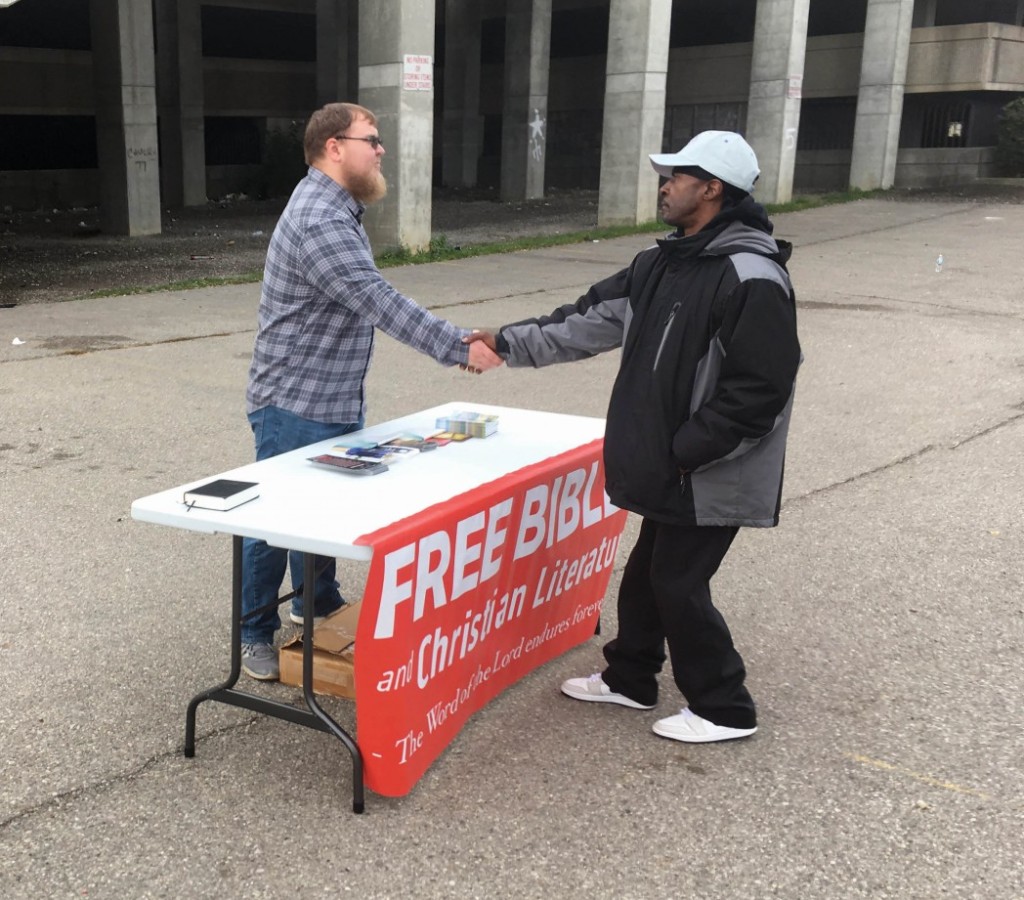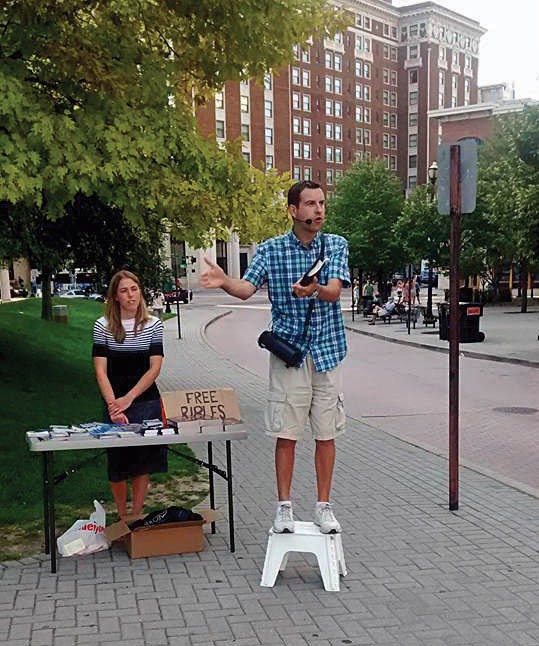Introduction
When you see a man preaching on the street corner, what enters your mind? Common reactions include, Is this really biblical? Aren’t there less offensive ways to evangelize? I thought only Arminians did this sort of thing! and, Does it really work?
Such responses are completely understandable. It’s not every day that you see an evangelical pastor—much less your own local RP pastor—preaching in the public square. On those rare occasions when you have seen a street preacher, it has likely been a fire-breathing fundamentalist holding up a Repent or Burn! sign and heaping legalistic condemnation on every pedestrian in sight. Who in their right mind would want to be associated with that?
We aim to provide a brief introduction to biblical open-air preaching and, in so doing, address some of these common reactions among Christians. In future articles, we plan to address the biblical mandate for this practice, its rich Reformed history, some practical how-tos, and examples of God’s blessing in this lost art of evangelism.
Our vision is to see the Reformed church in general—and the RP Church in particular—recover her evangelistic heritage as a public witness to God’s saving grace and Christ’s royal authority. We pray that congregations would begin to develop and equip open-air outreach teams for the purpose of “holding forth the word of life” (Phil. 2:16) to lost sinners in the “highways and hedges” (Luke 14:23) of our communities.
What Is Open-Air Preaching?
Open-air preaching is the heralding of the gospel of salvation in the public square to the glory of God. It involves going to where the people are, loving them as Christ did, and seeking to save that which is lost. It entails commanding fellow sinners in “repentance toward God, and faith toward our Lord Jesus Christ” (Acts 20:21). It is the doctrine of Christ’s mediatorial kingship in action: calling all people everywhere to repent of their sins, turn to Christ in faith, and bow the knee to the King of kings.
Open-air preaching takes the evangelistic preaching we hear inside the church and proclaims it to those on the outside. Where are most people on the Lord’s Day? They are shopping, they are watching sports, or they are relaxing at home. They are engaged in all sorts of activities, except for one—attending a sound, Bible-believing, gospel-preaching church! If these people are to hear the gospel message before it’s too late, we must do more than simply preach it from our pulpits. Christ has commanded His church to “go” and offer His gospel to everyone, not merely to existing churchgoers.
Open-air preaching is not the only method of biblical evangelism. Pulpit evangelism is central. Parental evangelism and personal witness are essential. Church events, Bible studies, and door-to-door efforts are helpful. We need all of these methods. If all evangelism were personal, most people would never hear the gospel. If all evangelism were done on a street corner, most people would never experience the long-term witness of a godly friend. We must avoid the temptation to set pulpit evangelism against personal evangelism, or personal evangelism against open-air witnessing. We need balance!
Biblical open-air preaching is an exercise in compassion. It does not consist in hateful shouting but in a respectful, orderly proclamation of the truth in love. Its message is not “law, law, law!” but “guilt, grace, glory!” It does not consist in finger-pointing but in saying, “Come…and I will declare what he hath done for my soul” (Ps. 66:16). It does not ambush perfect strangers with impersonal propositions, but it engages individuals and develops relationships. It does not flow from pride but from humble dependence upon God. It does not rely upon the flesh but upon the Spirit. It not only seeks conversion but also discipleship and growth. It is not autonomous but is grounded in local church ecclesiology.
Best of all, open-air preaching is for everyone. Some will “go, stand and speak” (Acts 5:20) the unsearchable riches of Christ. Others will distribute tracts and engage in one-on-one conversations, while the rest of us pray earnestly for God’s blessing and the salvation of souls.
Why Should We Preach in the Open Air?
Everything we do in the Christian life, including evangelism, should be founded upon the Bible. In our next article, we plan to provide a more detailed biblical case for street preaching. For now, we turn your attention to the Great Commission, where Christ commands His disciples to “go ye into all the world, and preach the gospel to every creature” (Mark 16:15). Friberg’s Lexicon says the word translated preach refers to “the official activity of a herald, [to] announce, publicly proclaim” and to “make known extensively, tell everywhere.”
Think of an old town crier. Each day he goes to the marketplace, where the people are gathered, and publicly heralds the message commissioned to him. Why does he do this? Why not speak to each person one-on-one? Such a method, of course, would be highly inefficient, if not impossible. Unless he speaks publicly, few will hear his message.
Is there any more important message than the gospel? If the countless multitudes of lost sinners in our society are to be saved, they must hear this message! As Paul says in Romans 10:14, “How shall they hear without a preacher?” Christ calls us to go to the public square and to herald His gospel so that all may hear and be saved.
I (Craig) was brought up in the east end of Glasgow, Scotland. No one in my area knew about Christ or attended church. There is a saying in Glasgow that more people go to the public bar on a Sunday than to church. It is true!
When I was in my early twenties, my heart burned inside me: my city was going to hell for its sins. I knew the remedy, but what could I do? I couldn’t just sit back and do nothing, so I began handing out tracts. I had a notion to preach, but I felt that I couldn’t. “I am not smart enough; I am not gifted enough,” I thought. Eventually my own inadequacies faded into the background, as visions of fire and torment began to trump my own fear of man. One day I stood on a stone bench and started to preach the good news of salvation. Within minutes, I had people asking me questions about God and the Bible. This led to one-on-one conversations.
Fast forward to Grand Rapids, Mich., in 2016, when I was ordained as the pastor of First Reformed Presbyterian Church. How could our small congregation possibly reach the 180,000 people who reside in our city, not to mention the many others in her surrounding townships? With God’s help, we began preaching the gospel downtown every Tuesday. As a result, people came to church, attended Bible studies, and real relationships were formed. Many others who do not attend church and have no Bible-believing friends or relatives are now hearing the gospel and seeing it lived out by members of First RP. Praise God!
Does It Work?
This is a popular question, and in many ways a valid question. But what lies behind it? Is it a desire to hear of God’s glorious work of saving sinners? Or is it implying that we should only engage in evangelistic methods that seem successful? As Reformed Christians, we do not do ministry out of a pragmatic spirit. We search and obey the Scriptures, leaving the results to God. According to Scripture, gospel preaching is the primary means of saving lost sinners (1 Cor. 1:21; WSC 88). As Calvinists, we believe that, while man is responsible to employ the means, God alone converts.
Open-air preaching exposes our hearts. Do we measure success by faithfulness or by numbers, by obedience to God or by church growth? As Calvinists, we claim to depend on the Holy Spirit to regenerate totally depraved sinners, but does our evangelism reflect this truth? Is it possible that we have adopted an Arminian mindset, seeking to adapt our message and methods to the felt needs of a carnal audience, hoping to win them apart from a supernatural work of God?
The good news is that God has promised to bless the proclamation of the gospel. Multitudes throughout the centuries have been saved through open-air preaching. A sister from Glasgow was once a heroin addict. She walked along Buchanan Street one day and saw a man preaching. All she heard was, “Jesus sets you free.” The next morning, she awoke with these words ringing in her mind. The Spirit was striving. She went to a store and bought a Bible. A few weeks later she was saved. She attended a local church and was discipled by the pastor. She now works in a Christian drug addiction center, seeking to show the same love that Christ has shown her.
A friend of mine preached faithfully in Brisbane, Australia, every Friday night. A man in a biker gang used to frequent a nearby bar with his crew. At first, he ignored the preacher. Later, he would stop and listen for a few minutes before entering the bar. Eventually, he stopped going to the bar and instead sat down on the pavement every Friday night to listen. Within six months he repented of his sins and trusted in Christ for salvation. The street preacher sent him to a local church, where he became a member.
There are so many stories of God saving lost sinners through the means of public proclamation. Does it work? Does it save? No, that is God’s job; and yes, yes He does!
Conclusion
Open-air preaching may not be the norm today, but God has used it mightily to glorify Himself by saving sinners. How does your congregation bring the good news of salvation to the thousands or millions in your area? If we could evangelize everyone one-on-one that would be wonderful, but we cannot. We can, however, reach great multitudes of people by going where they are and declaring to them the glorious gospel of Jesus Christ.
Craig Scott is pastor of First (Grand Rapids, Mich.) RPC. Adam Kuehner is pastor of Southfield, Mich., RPC.

